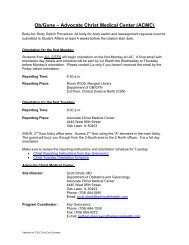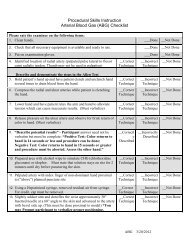a PDF version of the Full Hematology Oncology Curriculum
a PDF version of the Full Hematology Oncology Curriculum
a PDF version of the Full Hematology Oncology Curriculum
You also want an ePaper? Increase the reach of your titles
YUMPU automatically turns print PDFs into web optimized ePapers that Google loves.
Fellow Year 2+3:<br />
Second and third year fellows rotate on Inpatient <strong>Oncology</strong> service 1‐2 months during <strong>the</strong> year. They<br />
should be familiar with basic disease pathology and physiology. During <strong>the</strong>ir second and third years<br />
fellows should now be focusing appropriate treatment strategies and management <strong>of</strong> acute toxicities<br />
ei<strong>the</strong>r from <strong>the</strong> disease or <strong>the</strong> <strong>the</strong>rapies <strong>the</strong>mselves.<br />
Knowledge<br />
At this level <strong>of</strong> training, fellows need to develop a deeper knowledge <strong>of</strong> <strong>the</strong> areas <strong>of</strong> listed below. They<br />
should already be familiar with most diagnoses being evaluated. They will explore <strong>the</strong> recent literature<br />
to deepen <strong>the</strong>ir level <strong>of</strong> understanding <strong>of</strong> interesting cases. Within <strong>the</strong> areas <strong>of</strong> knowledge fellows<br />
should identify and actively pursue areas <strong>the</strong>y do not know as well for improvement.<br />
Skills<br />
Fellows in <strong>the</strong> second and third years <strong>of</strong> fellowship must perfect <strong>the</strong>ir skills. The most important may be<br />
for <strong>the</strong> senior fellow to function as a junior attending in many ways and be able to run service in an<br />
independent manner, although still under <strong>the</strong> supervision <strong>of</strong> <strong>the</strong> attending on service. They should be<br />
able to provide reasonable diagnostic and <strong>the</strong>rapeutic plans in most consultations except in <strong>the</strong> most<br />
complex cases.<br />
Areas <strong>of</strong> Knowledge<br />
Will be learned throughout <strong>the</strong> three years <strong>of</strong> fellowship.<br />
Basic Principles <strong>of</strong> <strong>Oncology</strong> Diagnosis and Management<br />
1. Basic science and pathogenesis <strong>of</strong> specific tumor type<br />
a. Risk factors<br />
2. Epidemiology <strong>of</strong> specific tumor types<br />
a. Geographic variations<br />
b. Gender differences<br />
3. Pathophysiology<br />
a. Understanding <strong>the</strong> molecular and evolving physiologic traits <strong>of</strong> specific tumor types<br />
4. Introduction to chemo<strong>the</strong>rapy<br />
a. Indications<br />
b. Pharmacokinetics<br />
c. Side effect pr<strong>of</strong>iles<br />
d. Drug interactions<br />
e. Contraindications<br />
f. Dose adjustments<br />
5. Introduction to targeted/immuno<strong>the</strong>rapy<br />
a. Indications<br />
b. Pharmacokinetics<br />
c. Side effect pr<strong>of</strong>iles<br />
d. Drug interactions<br />
44



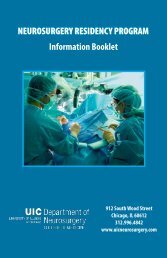
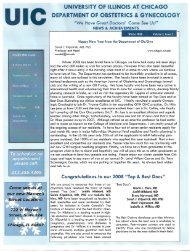
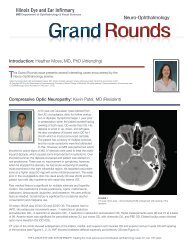
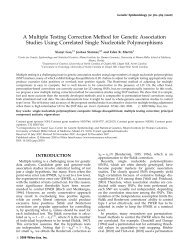
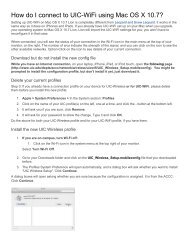
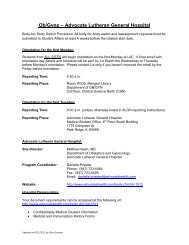
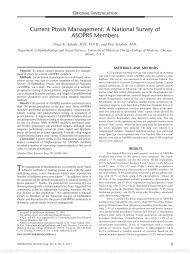
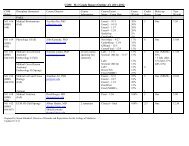
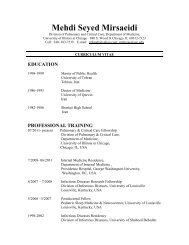
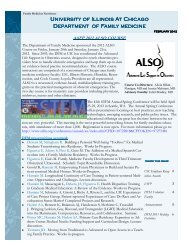
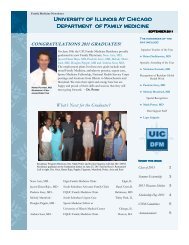
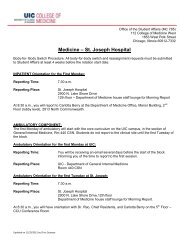
![CV Joan [W51] - University of Illinois College of Medicine at Chicago ...](https://img.yumpu.com/17336863/1/190x245/cv-joan-w51-university-of-illinois-college-of-medicine-at-chicago-.jpg?quality=85)
